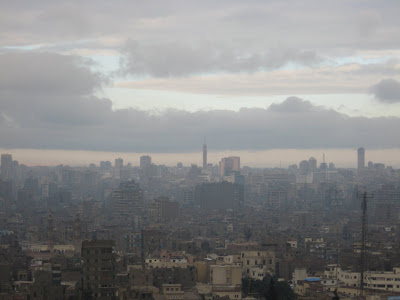But enough of looking ahead, I still have some writing to do about the past. Egypt already seems like a distant past (how does coming to Notre Dame seem like yesterday, considering that), and recently I've even begun to miss the craziness, and not just the cheapness, of Cairo. A friend of mine was said that international travel can be a double-edged sword, because one will always miss the places you've been after you have left, even if you weren't always happy while there. When I think of the shortcomings of one particular time and place it certainly is tempting to remember a place with other faults, and wish you were there instead. The best course of action, as the ever-inspirational Lt. Karnowski said, is to "live the dream." And a large part of that is realizing the dream can apply to the present, no matter how unlikely that may seem.
That advice is easier given than taken, and for the last month in Egypt I was often very anxious to return to the United States. Most of all my attitude depended on my company; when I was with Jonathon Neme, who has a year and a half left at AUC, we would talk about his future plans in Cairo and I might even wish I could be there to see them. But on the 7:00 bus to campus with fellow ND students a much different attitude would prevail, and the remaining time would seem to stretch to eternity.
With the benefit of hindsight I can say that Cairo was an amazing experience, certainly one that is much different than the usual time studying abroad. It was different world, enough so that answering questions like "how was Egypt" usually seems impossible to answer (not that you shouldn't ask! The interest is appreciated, just don't be surprised if I don't know what to say). But it is not just the "third worldliness" of Cairo that made it so different. Many students visit and work in more impoverished areas than Cairo, and their experiences are probably as foreign to me as mine are to someone who has never left middle-class America. Part of what makes Cairo unique is the juxtaposition of world-class hotels boasting fabulous luxury with miles of brick and concrete jungle filled with grit and garbage, with a liberal sprinkling of mosques both ancient and new throughout. Yet, despite its often squalid condition Cairo is a very safe city, one in which I never felt endangered, even when it seemed like we were the only white people who had ever visited a particular neighborhood. Indeed, those were the city trips that were most worth taking, because you might escape the hordes of salesmen who love nothing more than the sight of a possibly gullible khawaga (tourist).
I sometimes wondered if this friendly, albeit opportunistic, attitude towards Westerners is a product of the Mubarak regime, under which Americans seem to granted privileges in exchange for our government's generous support. There are certainly hostile Egyptians, as the terrorist attacks of the 90's and early 00's showed. But, judging by the stories of friends who traveled to Lebanon and Syria, Arabs truly are by and large a welcoming people, eager to dispel the negative notions that they typically assume Westerners hold about them. And I hope that in Egypt this continues to be true, beyond the time when the government makes it true.
Perhaps Cairo can be seen as a tapestry, which often seems to be uniformly brown, crowded and noisy. Only a closer inspection reveals some of the color and life beneath the exterior. Apartments that appear drab are often surprisingly luxurious. A plain door at the top of a broken staircase leads to a workshop filled with beautiful tapestries that might fetch hundreds of dollars in the States. And it seems like every block has a store that sells fresh juice which simply cannot be matched by American grocery store juice, or even expensive juice stands.
But there are real problems in Egypt, which must be addressed at some time. The growth of the city is unmanageable, particularly given Egypt's limited supply of arable land. There is a sharp divide between wealthy and poor, despite the efforts of socialist governments. Corruption is so common that it hardly has any negative connotation, and is often simply seen as baksheesh, a sort of tip. For every Egyptian who extends a warm, genuine welcome it seems like there are two who will lie and wheedle you in any possible way for a buck, even though they are usually among those who don't need it. Mubarak seems like Castro, a leftover from another era whose impossibly long decline keeps an entire country from moving on; whether it will move on to new prosperity or further problems seems impossible to tell.
Of course all of these thoughts come from a very limited perspective, that of an American who spent most of his short time in Egypt with the stratospherically wealthy portions of Egyptians who can attend AUC, and throughout his stay enjoyed the benefits of being able get away with much that a real Egyptian could never do, purely because he is a Westerner. In the end I was also a khawaga, one was a little more knowledgeable about the local language and culture, and who spent a little more time than usual in country, but in reality can scarcely know what it actually is to grow up and live as an Egyptian.

Josh, I really enjoyed reading that post. :) I think it summed up a lot of how I felt in and after Ireland (but also contained some incredibly profound observations on Egypt itself).
ReplyDeleteI look forward to talking about it in person.
I have spent the last hour reading your blog, it makes me excited for my semester in Cairo. Good Job!
ReplyDelete